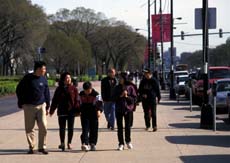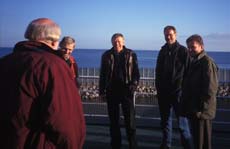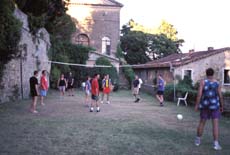Actions that don't need places

Conversation among celebrants of Bloomsday -- an action that can be performed only on a specific day at specific locations in Dublin

Conversing while walking on a Chicago street -- an action that has no requirement for being performed in a definite place

Conversing while waiting for a ferry in Denmark -- an action that has no requirement for being performed in a definite place

Evening volleyball at a philosophy conference -- an action that demands certain qualities in its place

A city central library (Tampere, Finland)-- libraries have traditionally allowed only certain kinds of actions, but lately have been expanding their repertory; libraries have always been forests for hunter-gatherers but now the search can be conducted in new ways and from remote locations.
Like hunters and gatherers who take for granted the abundance of food "out there" and therefore only hunt and gather enough to consume immediately, we are increasingly becoming a "subsistence information society." Rather than engage in long-term storage of knowledge in their memories or homes, many people are beginning to believe that information is available "out there" and that individuals do not need to stockpile it. . . . The connections found are often consumed and digested immediately without being painstakingly linked to other knowledge and ideas. . . . Many of the features of our "information age" make us resemble the most primitive of social and political forms: the hunting and gathering society. As nomadic peoples, hunters and gatherers . . . have little "sense of place"; specific activities and behaviors are not tightly fixed to specific physical settings. . . . electronic media create new types of social situations that transcend physically defined social settings and have their own rules and role expectations. Meyrowitz 1985, 315-17, 333While this analogy is striking, it may be that social actions that appear to have no place assigned to them actually are normatively assigned to spatially discontinuous places. Meyrowitz's contrast might remind us of Deleuze's discussion of striated and smooth spaces, but Meyrowitz's placeless actions are actually less tied to particular locations than are the precise adjustments to local conditions that guide Deleuze's nomads.